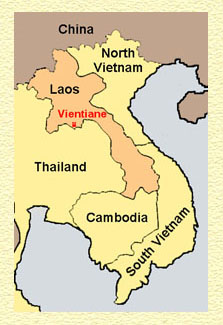

INTERVIEWER: Were you involved in one particular church in the...?
SAWYER: The only church that there...there was only one church in the city of Vientiane, and
that was our Lao Hmong church, or Miao tribespeople, and we ourselves attended the church
there all the time. The same church building was used for an international community that was
there, because the [pauses] Americans had sent so many people in because of the war and aid
programs and health programs and this kind of thing. So we were involved some in the
international church. But our role in the...in the big church itself was just to teach the people how
to run it themselves. We didn't do the preaching. I sometimes taught the women's Sunday school
class, but I was constantly trying to teach a woman how to do it, and I'd sit beside her and help
her teach the class rather than teach it myself. And our missionary men, as much as possible,
would have a national pastor preach. If he needed help, they'd help him on the side, but have him
take the responsibility, because we were trying to develop an indigenous church that could run
itself. And we did. I mean the...the church among the Miao tribespeople was strong, and that's
why it's so strong here in the church today, because they had a strong independent spirit when
they were on the field.

INTERVIEWER: You mentioned something before about concentrating in the southern part of the country because of fighting in the north. How...how exactly did that effect your work?
SAWYER: Okay. When the...when we first were young missionaries we could travel in the villages and evangelize. But because of the war with the...there was the war with the French for awhile, and then Laos became independent. But then when the war began in Vietnam, Laos was used just as a...a pathway from North Vietnam to South Vietnam by the communists. And so it was constantly...there was constant war in the north. And although American soldiers were supposedly not stationed in Laos, they came across from North Vietnam [pauses] across the northern part of Laos, and villages were bombed all the time in order to drive the communists back. And as a result of this, while...you know, we hated all that war and everything, it actually was a great [chuckles]...great help to our missionary work, because all these isolated villages where missionaries or national pastors would work...would walk four to five days to get to a group of twenty-five houses, for instance, where there were maybe twenty of them were Christians, and sometimes the whole village was a Christian village. They would walk there and...and work with those twenty-five families for a weekend or spend a week there, and then they wouldn't see them again for months, because they had other villages to go to. But when the war came and there was all this fighting in the north, all this travel of missionaries out to those villages was completely cut off and we began to concentrate on training men and sending them into the villages. But, as the villages...as the war continued, and there was more and more difficulty, and people were afraid of being cut off, and they couldn't make their rice fields because of the bombings and everything, they fled and came into large centers. So what we had was five or six villages in one center, and at that time we initiated the MAF program, Mission Aviation Fellowship, so that missionaries could fly over all the trouble and fly up into these centers. Instead of going up to a place and having twenty-five village...twenty-five families, they'd go up to a place were there were a hundred or two hundred Christian families concentrated in an area, and they could, you know, preach to four or five hundred people in one...one center like that. And so the church really began to get strong because they got more teaching, and they were in these centers, and they were visited by missionaries and by the national pastors on a regular basis. And then when we used MAF, we had Bible school in Vientiane...in the capital city. Every weekend we sent the students out by plane to these villages for Sunday school teaching, and....and young peoples work, and they would also preach in the villages and...and help the pastors. If there were...there were no pa...no pastors, we took the responsibility from the Bible school. So because of the war actually it...it helped us. But for years missionaries did not travel over land anymore because of the communist war.
INTERVIEWER: Were there any negative feelings on the part of the Laotian people because of the Americans being in the war.
SAWYER: You always have that, especially...not the.... The Miao or the Hmong tribal people were very loyal. They were called the CIA army, you know. They were the ones that were fighting up in the north. But the Lao people themselves, some of them, especially if they were influenced at all by the communists, were anti-American. But we didn't have that so much in Laos as you do in other countries. The Lao people were...were kind of slow, easygoing, not [pauses] not very antagonistic, just...not really really friendly to us, sincerely friendly to us, but they were...they were kind. And we had a lot...a lot of friends among the Lao people, even before we left Laos. And there were several strong Christian families in the southern part of Laos, and some of them as they grew up and married came up into the north, and we did have strong Christians among the Lao, but not as many as among the tribal people.
For more information about Sawyer, Collection 256, or to read the entire transcripts her interviews, click here.